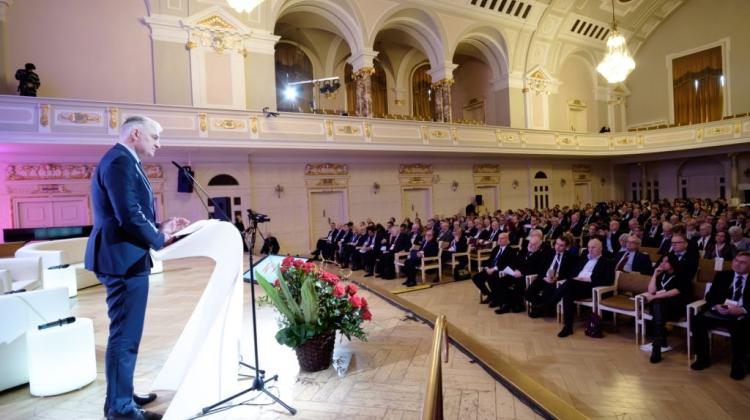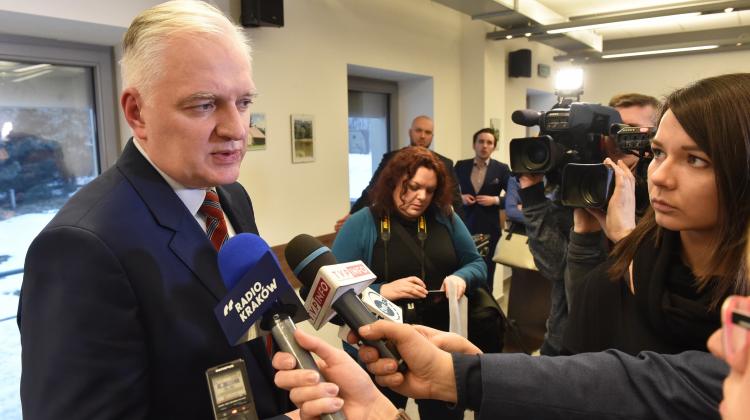Gowin: Companies investing in research will gain up to PLN 0.5 billion per year

On Tuesday the Sejm began work on the so-called small law on innovation. Deputy Prime Minister, Minister of Science Jarosław Gowin estimates that as a result of the new regulations, companies that invest in innovation will save up to PLN 0.5 billion per year.
The draft amendment of certain laws defining the conditions for conducting innovative activity (the so-called small law on innovation) includes tax breaks and facilities easier for companies conducting research and development activities, as well as changes concerning the commercialisation of research at public universities.
During Tuesday\'s press conference in the Parliament, Deputy Prime Minister and Minister of Science and Higher Education Jarosław Gowin admitted that the legal changes are a necessary condition, but not sufficient to ensure increased innovation in Poland. "The knowledge of human nature - and entrepreneurs, and scientists - indicates that the factor likely to quickly encourage a change of mentality, culture change, a culture of risk - because where there\'s innovation, there is always a risk - are always economic incentives. The most important part of this law (...) are real tax deductions for a large group of Polish businesses. We estimate that the entrepreneurs who decide to engage in pro-innovation activities, will save up to PLN 0.5 billion per year" - said Jarosław Gowin.
In turn, Deputy Minister of Science Piotr Dardziński added that it would be impossible to decree innovation, but the law could hinder innovation. "Today, entrepreneurs and scientists are increasingly convinced that they must work together. But as long as the legal system discourages this activity, it never will end in success. The law can not prescribe cooperation, but it can create a space in which cooperation can develop better" - he argued.
The small law on innovation is one of the elements of the strategy for changes in science and higher education. This strategy is based on three pillars. The first is the "new constitution for science." It is based on the new Higher Education Law, in which, among other things, a new type of universities would be distinguished: research universities. The second pillar of the strategy concerns the partnership of science and business (it includes the small law on innovation). The third pillar of the reform concerns the so-called social responsibility of science that should be more widely open to the daily needs of the citizens.
The bill, as well as to the whole strategy, was welcomed at the press conference by the President of the Polish Union of Entrepreneurs and Employers, Cezary Kaźmierczak. "Now is the time to move the Polish economy from fight with prices to fighting with +better and differently+, and innovative economy. I think that Gowin\'s strategy for cooperation of business and science can contribute to this" - said Kaźmierczak. He added that the program was consistent with building social capital - contributing to the elimination of competition between business and science and showing that the interests of the government, entrepreneurs and scientists, and employees are one and the same.
The draft amendment - prepared by the Ministry of Science - will abolish corporate income tax on the contribution of intellectual and industrial property. The list of deductible costs will be expanded, and the amount of the maximum deduction of eligible costs incurred for research and development increased. The period in which entrepreneurs may deduct research and development costs will be extended from 3 to 6 years. There will also be cash returns for emerging companies (start-ups) conducting R&D activities.
In addition, the amendment will modify the procedure for "enfranchisement of scientists", i.e. the acquisition of property rights to inventions. The enfranchisement procedure (as an option) will be used by universities only when the researcher who submits research results notifies of his interest in enfranchisement. The new rule - as Dardziński explained - is intended to reduce unnecessary bureaucracy.
The draft amendment also removes the time limit in which the authors of inventions are entitled to a share in the profits from commercialisation.
PAP - Science and Scholarship in Poland
lt/ agt/ mrt/
tr. RL
Przed dodaniem komentarza prosimy o zapoznanie z Regulaminem forum serwisu Nauka w Polsce.
















